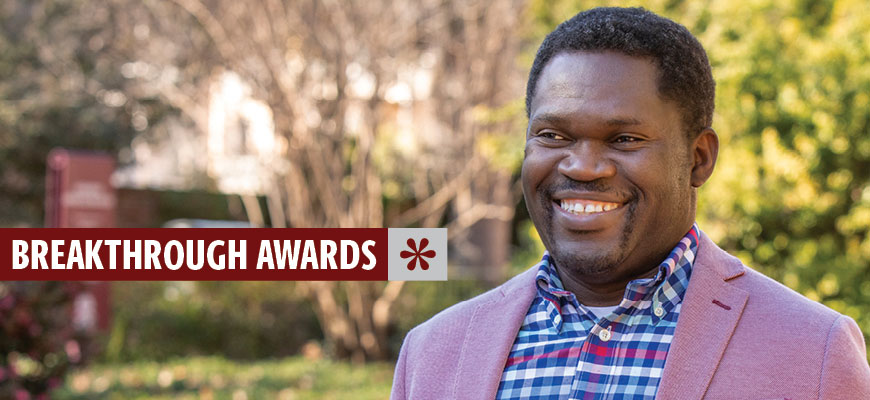
Breakthrough Star: Bankole Olatosi
Public health researcher uses big data to improve well being
Posted on: June 1, 2021; Updated on: June 1, 2021
By Megan Sexton, msexton@mailbox.sc.edu, 803-777-1421
Simply by chance, Bankole Olatosi attended a business training session in 2009 that covered the use of analytics for everything from combating credit card fraud to monitoring deep well drilling in oceans.
It was, says the assistant professor trained in health services research, his “lightbulb moment.”
“Seeing how this was applied in non-health related fields like Facebook and other social media sites in targeting advertisements to consumers, I thought of ways we could apply this to patients in health care,” Olatosi says. “Recognizing the move to mandatory electronic health records, and recognizing patient behavior is predictable based on prior history, I became determined in leveraging and applying this approach to improve health care. So, for the past 10 years, I have developed and fine-tuned my competencies in big data science.”
Olatosi’s research in the Arnold School of Public Health is focused on improving health outcomes by identifying and examining patterns found in large sets of patient-generated data. He looks for unique patient characteristics and uses the data to create a story about what each patient needs to thrive.
“It leverages the same techniques social media uses to profile consumers and target products or advertisements to them. Applied to health care, I use it to help target patients or individuals with the type of care that will work best for them. I also use it to inform providers about patient behaviors they need to be aware of to improve health,” he says.
The huge mass of health care data available today — collected from data streams such as electronic health records, smartphones, smartwatches, genomic data and social media data — can be used to unlock ways to better understand, treat and improve patients’ quality of life.
I have found senior mentors who are willing to invest in me and guide me through my research career. Mentorship has been pivotal to my current success.
Bankole Olatosi
“Traditional statistical methods will not be enough to provide precision medicine to patients. Therefore, we need to complement these traditional methods with machine learning approaches,” he says.
Olatosi says he is proud of the ongoing work being done on infectious diseases for both HIV and COVID-19.
“Using big data science, we are working hand-in-hand with clinicians and other stakeholders in a transformative way to produce clinically important models and prompts that providers can use to improve health care for South Carolinians,” he says.
And going forward, the power of big data is going to be critical to care for COVID-19 patients and survivors. Because the disease is new, much remains unknown about the long-term or lingering impacts of the disease.
“Through active monitoring using big data science, we can gain insights and intelligence quickly at the individual level about the long-term impacts of this new disease,” he says. “Doing so will enable us to respond with appropriate treatments and interventions to enable those affected to live quality lives.”
Olatosi, who completed his doctoral training in the Arnold School’s Department of Health Services Policy and Management, says the university has allowed him to set up important collaborations that shape his work.
“I am able to work across schools and colleges as a part of multidisciplinary research teams. In addition, I have found senior mentors who are willing to invest in me and guide me through my research career. Mentorship has been pivotal to my current success.”